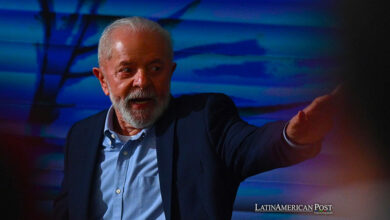“The two leaders gladly accepted the respective invitations”, North Korean central news
Kim Jong-un not only agreed to visit the United States but also to the denuclearization of the Korean peninsula, and Trump pledged to offer guarantees to the Asian country

"Kim Jong-un invited Trump to visit Pyongyang at a convenient time, and Trump invited Kim Jong-un to visit the US," the North Korean Central News Agency (KCNA) announced the conclusion of the meeting between the two leaders in Singapore.
Leer en español: "Los dos líderes aceptaron con mucho gusto las respectivas invitaciones", central noticias Norcorea
During the historic summit, the North Korea's leader, Kim Jong-un, and the U.S. president, Donald Trump, made clear the importance of going step-by-step in the construction of bilateral relations, as well as the adoption of mutual actions to achieve peace and denuclearization on the Korean peninsula, according to the North Korean media, this Wednesday.
The summit and the resulting agreement
After the initial greeting, Trump and Kim went to talk alone for 43 minutes. That first moment was accompanied by a dense tension that with the passing of the hours was dissolving. In the initial moment, the two leaders were anxious and with confused expectations. However, during the time of signing the bilateral agreement, both leaders were more relaxed, as well as more comfortable facing one another.
"The two leaders gladly accepted the respective invitations, with the conviction that there will be another important opportunity to improve relations" between both countries, assured KCNA during its special coverage. There was also a broad and in-depth debate on the establishment of new relations between North Korea, also known as the Democratic People's Republic of Korea (DPRK), and the United States, and the construction of a permanent and lasting peace mechanism. Hence, the final agreement of the summit in Singapore reflects more a desire to build mutual relations, based on overcoming differences between the two countries: denuclearization mainly.
You may also be interested: Will Kim Jong-un end as Gaddafi?
Although the agreement was not officially disclosed, an oversight by President Donald Trump in showing the signature of the two presidents allowed photographers and reporters to capture what both countries had accepted. Mainly speaking of the new relations between the United States and the Democratic People's Republic of Korea, as well as the establishment of a durable and robust peace regime in the Korean peninsula.
President Trump pledged to provide security guarantees to the DPRK, and President Kim Jong-un reaffirmed his firm and determined commitment to complete the denuclearization of the Korean peninsula.
Reactions to the agreement
Professor Robert Kelly, an expert on Korean affairs at the National University of Pusan, located in South Korea, said that the document is quite generic and that nothing was actually achieved in these unprecedented talks. "While this is the first time that the leaders of the nations have met in seventy years, and that is a breakthrough, what is exposed on paper does not say much," Kelly said in a statement at the University of Pusan. For his part, James Acton, senior researcher of the Nuclear Policy Program at Carnegie Endowment for International Peace, said in his Twitter account that "denuclearization language is meaninglessly weak for 3 reasons: 1. (Talk about working) "Towards"; 2. For the DPRK, the denuclearization of the Korean peninsula is not equal to unilateral disarmament; 3. By reaffirming Panmunjom declaration, US effectively conceded that Korea denuclearization part of global disarmament."
The denuclearization language is meaninglessly weak for 3 reasons:
1. "Towards"
2. For DPRK, "denuclearization of Korean Peninsula" ≠ unilateral disarmament.
3. By reaffirming Panmunjom declaration, US effectively conceded that Korean denuclearization part of global disarmament. pic.twitter.com/g6UvuBy75P
– (((James Acton))) (@ james_acton32) June 12, 2018
You can read: North Korea destroyed its nuclear test center in front of the international press
Lessons for Latin America
After months of tension between the United States and North Korea for their aggressive rhetoric, in which both leaders left few scenarios different from the war confrontation, Latin America can review the situation between the two countries to learn how to lead a better agenda with the North American power. While Donald Trump knows that there is no threat from Latin America to the US territory, he does know that Latinos nourish a large part of the US workforce, according to data from the Ministry of Labor.
On the other hand, situations such as those of Venezuela and Nicaragua, although they do not threaten the United States, can move the stability of the region towards an aggressive rhetoric among Latin Americans. Taking IGNORE INTO account these specific examples, Pablo Pozzi explains in an opinion article for Resumen Latinoamericano that "Latin America needs to be more defensive, without showing rudeness. While North Korea has nuclear weapons, Latin America has the American pantry, and what is more important, eating or bullets?". For Pozzi, Latin America has not known how to confront the American power. "Maduro is incoherent and coarse, but the rest of the region must demonstrate stealthily and demonstrate that it also has to threaten without lowered," says this Argentine historian, who sees the US-North Korea summit as a lesson for Latin America.
The region, analyzes Pozzi, sees with good eyes the rapprochement between the Asian country and the American power, but has not understood that this situation can teach it how to handle relations with its northern neighbor.
Latin American Post | Carlos Eduardo Gómez Avella
Translated from ""Los dos líderes aceptaron con mucho gusto las respectivas invitaciones", central noticias Norcorea"





